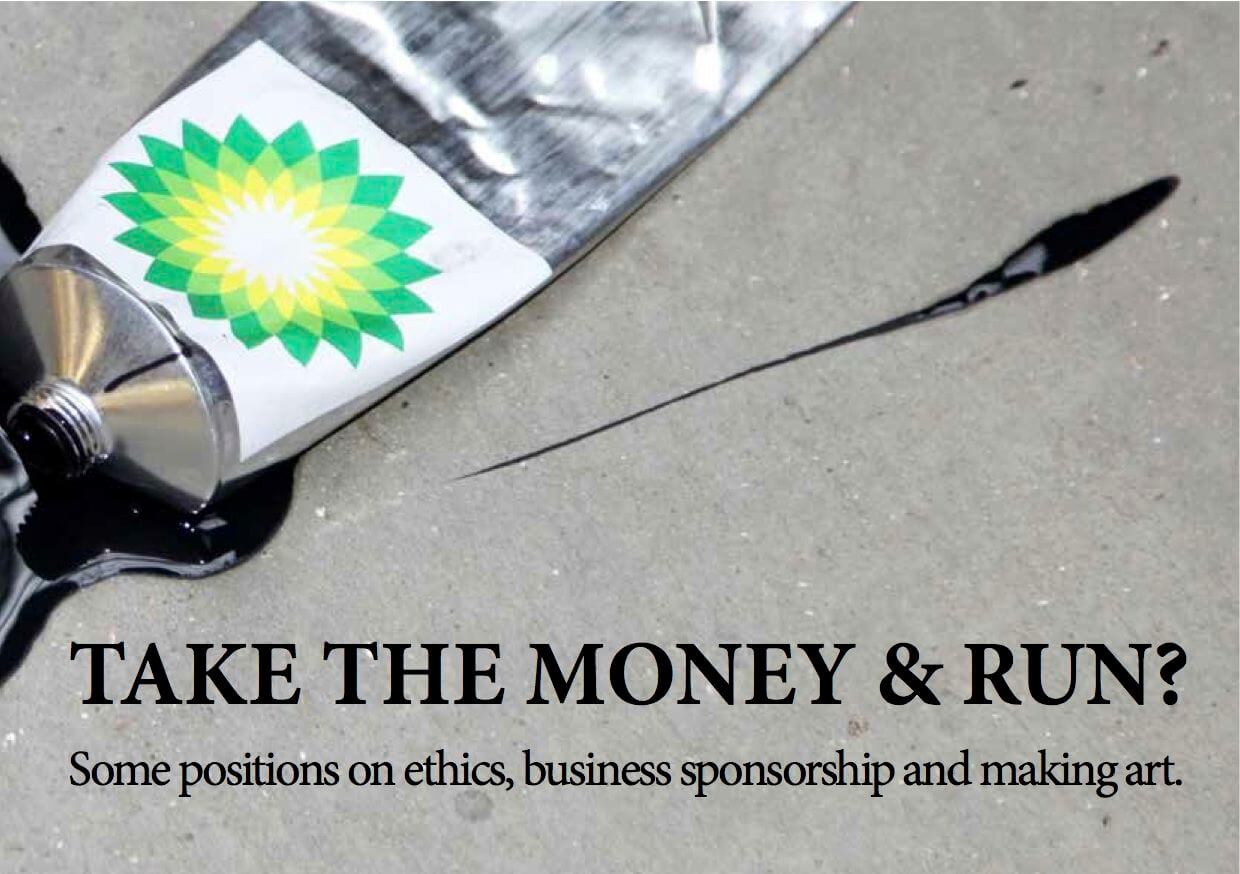 In the context of the furore that’s raging about artists provoking the Sydney Biennale to reject funding from Transfield Holdings – who run offshore detention centres for asylum seekers – now is the moment to really grasp just how incendiary the sources of our funding can be. Or to put it positively, just how important it is to think calmly about establishing a stance on ethics and funding, and to do it well in advance of a crisis.
In the context of the furore that’s raging about artists provoking the Sydney Biennale to reject funding from Transfield Holdings – who run offshore detention centres for asylum seekers – now is the moment to really grasp just how incendiary the sources of our funding can be. Or to put it positively, just how important it is to think calmly about establishing a stance on ethics and funding, and to do it well in advance of a crisis.
Platform has been working on this since the ’90s, with the issue coming into sharp focus when we were approached in distress by a sister arts organisation – Artists Agency – in the north-east of England. In good faith they had approached Shell Better Britain Campaign (now defunct) for funding to clean up a river in County Durham that had been polluted by toxic minewater when the pumps were switched off after the closure of the local coal mines. Around that time, in1995, Shell was suddenly targeted by Greenpeace and others for its proposal to dispose of its aging Brent Spar oil platform by dumping it in the North Sea. Things got even worse for Shell later in year, for its role in allowing the arrest and the execution of Nigerian activists Ken Saro-Wiwa and 8 others who had been protesting against Shell’s activities in the Niger Delta. Artists Agency began to feel utterly compromised: Shell Better Britain, Shell Worse Nigeria?
Together, our proposal was to start a public conversation on ethics and funding that turned into a two-year national network project called ‘Funding for a Change’ which was supported by Arts Council England. Over 200 people from the arts, environment, community, and social justice campaigns came together in five events, with the aim of investigating ethics and funding issues in order to strengthen ourselves. The project got a lot of press attention across a range of sectors. Platform then developed its first ethical funding policy. There have been many versions and revisions since, and in the past year we have changed the name to ‘guidelines’ which works better for us, as it suggests the complexity a little more. We also started offering workshops to share the experience and skills. We worked with Magic Me, Black Environment Network members, Artists Agency and even ran a plenary for a national conference of the Institute for Corporate Fundraising Managers that got rather rowdy.
 In July 2011, Platform was invited to run a workshop with three London-based arts organisations and their associates, to help them begin to think about ethics and funding. Artsadmin, Home Live Art and Live Art Development Agency (LADA) do cutting-edge work in performance and live art, and this process started an ongoing collaboration to build capacity and make a critical intervention in how the arts thinks about its values in relation to financial relationships. In 2012, LADA commissioned a ‘Study Room Guide’ from Platform which is a review of useful literature that can help in developing policy. The guide – ‘Take the Money and Run?‘ (free download) – was made into a print publication in 2013 and launched at a crowded public event with LADA and speakers from ArtsAdmin and Arts Professional (journal). The three live art organisations then decided to build ethical fundraising policy development in to a joint ‘Catalyst’ bid to the Arts Council. ‘Catalyst’ is the Arts Council’s new programme to develop arts organisations’ capacity in gaining support from philanthropy, and the consortium felt that it was crucial, as part of that, to address ethical issues. This was a bold move on their part. They were successful, and later in 2013, Platform was taken on to help devise a process with the groups which will unfold over two years.
In July 2011, Platform was invited to run a workshop with three London-based arts organisations and their associates, to help them begin to think about ethics and funding. Artsadmin, Home Live Art and Live Art Development Agency (LADA) do cutting-edge work in performance and live art, and this process started an ongoing collaboration to build capacity and make a critical intervention in how the arts thinks about its values in relation to financial relationships. In 2012, LADA commissioned a ‘Study Room Guide’ from Platform which is a review of useful literature that can help in developing policy. The guide – ‘Take the Money and Run?‘ (free download) – was made into a print publication in 2013 and launched at a crowded public event with LADA and speakers from ArtsAdmin and Arts Professional (journal). The three live art organisations then decided to build ethical fundraising policy development in to a joint ‘Catalyst’ bid to the Arts Council. ‘Catalyst’ is the Arts Council’s new programme to develop arts organisations’ capacity in gaining support from philanthropy, and the consortium felt that it was crucial, as part of that, to address ethical issues. This was a bold move on their part. They were successful, and later in 2013, Platform was taken on to help devise a process with the groups which will unfold over two years.
That process involves joint workshops with all staff from the three organisations – a method of valuing everyone’s input and sharing different perspectives which can help ensure that there are no big surprises from internal dissent erupting later on. Also, there will be one-to-one sessions focusing on individual organisations’ needs and challenges, plus workshops with management and board members as appropriate. Together we are thinking and researching about the ethics of individual donor fundraising, as well as business and corporate sponsorship. Creative approaches are in the mix and we will be commissioning artistic responses to the issues. There are plans being developed for a national practitioner-led gathering or conference later in the year which will have online interactivity to reach a wide audience. What Platform brings is methods and resources garnered over many years of our own processes, controversies, and internal discussions. Together we discuss and share – in confidentiality – difficult situations, ethical balancing acts, and mistakes made. Through these workshops, participants (and Platform) can take time to reflect and work out steps to a more grounded position that fits with the values that each organisation is putting out into the world.
In this kind of work, every organisation or group has to work at a speed appropriate to them to make a good internal process, and one thing we have found is that a ‘values statement’ is often the key to developing an ethical funding policy. If we know what we are standing for in the wider work and in our relationships in general, then we can more quickly position ourselves in relation to everything else, including funders, supporters, and finance. Here’s our recently published values statement, and our ethical fundraising guidelines – for us, two sides of the same coin. It’s important that we review them periodically, and there are unexpected situations that come up that force us to recognise that changes are needed, as in any policy.
A few months ago, Live Art Development Agency was ready to go public with their ethical fundraising policy. Here’s what the Agency told us about their motivation for the work:
The Live Art Development Agency wanted to ensure that its fundraising work, including from Trusts & Foundations and individuals, and its partnership relationships, were all underpinned by a publicly shared articulation of our ethical values and criteria. The development of the organisation’s first Ethical Fundraising Policy, which included close scrutiny and then approval of the Policy by LADA’s Board of Directors, is now an important foundation for our work. The Policy has already supported negotiations regarding partnership and contractual arrangements for publications and public events. (Jan 2014)
The sense of strength, solidity, and solidarity that developing and publishing a policy or guidelines can give – even a very short and simple one – is important in these times of increasing pressure to approach the private sector for funds and resources. It means that every member of staff knows where things stand, which can avoid all sorts of problems. It means that audiences and funders, artists and collaborators/partners are clear. As LADA indicate in their last line, even if we ourselves refuse to approach certain businesses or private individuals for ethical reasons, our partners whom we respect and want to work with might. What to do then? A policy makes all the difference in what can be a very heated and upsetting situation.
As we argued in a recent piece for the Arts Council’s ‘Sustainability’ blog, we would urge arts organisations to get ahead of the game and begin the process now. Do it before getting into the spotlight for all the wrong reasons. Avoid having to manage all that pain, outcry, and dissent of the kind that is coursing round the Sydney Biennale and its universe during these past weeks.
On the other hand, if you are thinking of provoking action on this, an effective art intervention, boycott, or protest does brilliantly jump-start a long-overdue change in values.
Platform offers workshops on how to go about establishing an ethical funding policy. Book as a single organisation or get together with others for a group approach. We operate a sliding scale of costs. Contact [email protected] for details.